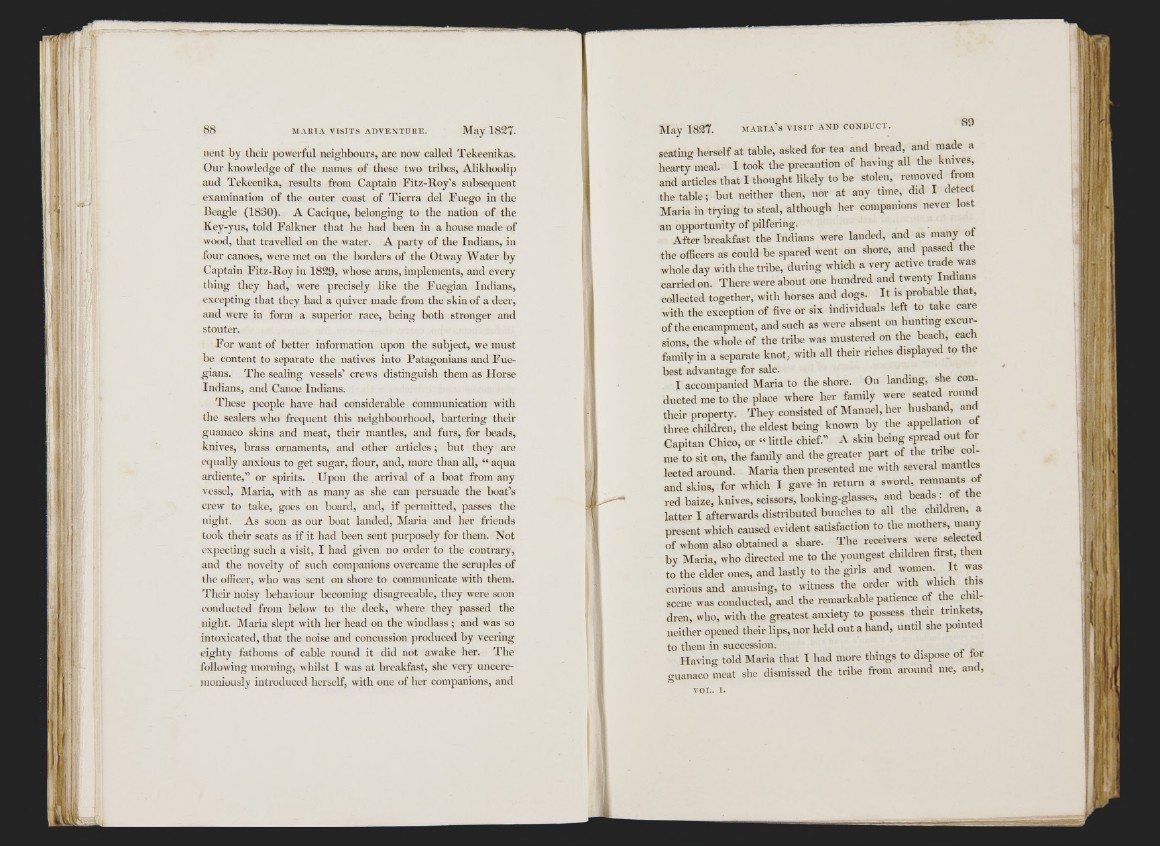
' . J :
is, ,
jnii
III!!
/i ■ 1t ¡4' :
Hi'
)*': ’
■. I)!
!
Ii
•\. <i./
it
88 M A l t IA VISITS ADVENTUKE. May 1827.
nent by their powerful neighbours, are now called Tokeenikas.
Our knowledge of the names of these two tribes, Alikhoolip
and Tekeenika, results from Captain Fitz-Roy’s subsequent
examination of the outer coast of Tierra del Fuego in the
Beagle (1830). A Cacique, belonging to the nation of the
Key-yus, told Falkner that he had been in a house made of
wood, that travelled on the water. A paity of the Indians, in
four canoes, were met on the borders of the Otway Water by
Captain Fitz-Roy in 1829, whose arms, implements, and every
thing they had, were precisely like the Fuegian Indians,
excepting that they had a quiver made from the skin of a deer,
and were in form a superior race, being both stronger and
stouter.
For ivant of better information upon the subject, we must
be content to separate the natives into Patagonians and Fuegians.
The sealing vessels’ crews distinguish them as Horse
Indians, and Canoe Indians.
These people have had considerable communication with
the sealers who frequent this neighbourhood, bai-tering their
guanaco skins and meat, their mantles, and furs, for beads,
knives, brass ornaments, and other articles; but they are
equally anxious to get sugar, flour, and, more thmi all, “ aqua
ardiente,” or spirits. Upon the arrival of a boat from any
vessel, Maria, with as many as she can persuade the boat’s
crew to take, goes on board, and, if permitted, passes the
night. As soon as our boat landed, Mai-ia and her friends
took their seats as if it had been sent purposely for them. Not
expecting such a visit, I had given no order to the contrary,
and the novelty of such companions overcame the scrujiles of
the ofiicer, who ivas sent on shore to communicate with tliem.
Their noisy behaviour becoming disagreeable, they were soon
conducted from below to the deck, where they passed the
night. Maria slept with her head on the windlass; and was so
intoxicated, that the noise and concussion produced by veering
eighty fathoms of cable round it did not awake hei-. The
following morning, whilst I was at breakfast, she very unceremoniously
introduced lierself, ivith one of her companions, and
May 1827. m a r i a ’s v i s i t a n d c o n d u c t .
seating herself at table, asked for tea and bread, and made a
hearty meal. I took the precaution of having all the knives,
and articles that I thought likely to be stolen, removed from
the table; but neither then, nor at any tune, did I detect
Maria in trying to steal, although her companions never lost
an opportunity of pilfering.
After breakfast the Indians were landed, and as many ot
the officers as could be spared went on shore, and passed the
whole day ivith the tribe, during which a very active trade was
carried on. There were about one hundred and twenty Indians
collected together, ivith horses and dogs. It is probable that,
with the exception of five or six individuals left to take care
of the encampment, and such as were absent on hunting excursions,
the whole of the tribe was mustered on the beach, each
family in a separate knot, with all their riches displayed to the
best advantage for sale.
I accompanied Mai'ia to the shore. On landing, she conducted
me to the place where her family were seated round
their property. They consisted of Manuel, her husband, and
three children, the eldest being knoini by the appellation ot
Capitan Chico, or “ little chief.” A skin being spread out for
me to sit on, the family and the greater pai-t of the tri e co -
lected around. Maria then presented me with several mantles
and skins, for which I gave in return a sword, remnants of
red baize, knives, scissors, looking-glasses, and beads: ot the
latter I afterwards distributed bunches to all the children, a
present which caused evident satisfaction to the mothers, many
of whom also obtained a sliai-e. The receivers were selected
by hlaria, who directed me to the youngest children first, then
to the elder ones, and lastly to the girls and women. It was
curious and amusing, to witness the order with wliicli this
scene was conducted, and the remarkable patience of the children,
who, with the greatest anxiety to possess their trinkets,
neither opened their lips, nor held out a hand, until she pointed
to them in succession.
Havino- told Maria that I had more things to dispose ot tor
guanaco meat she dismissed the tribe from ai'ound me, and,
VOL. 1.
b ' J i